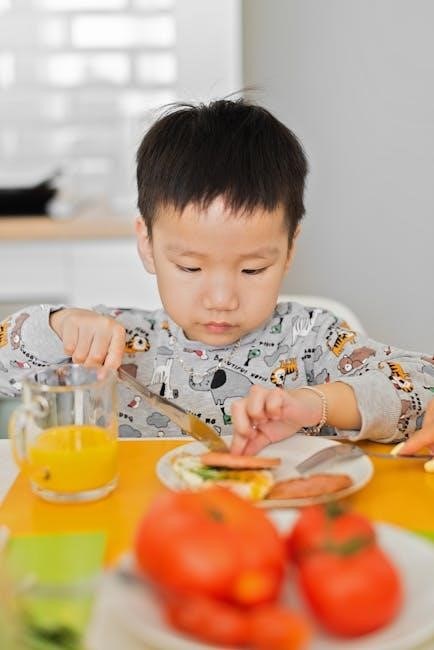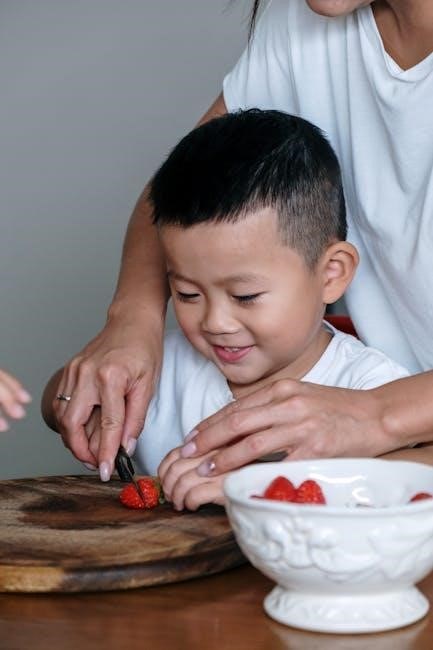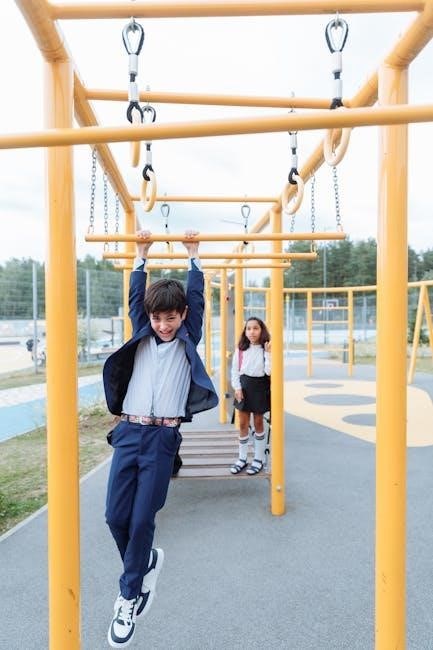Matthieu Ricard‚ a scientist-turned-Buddhist monk‚ argues that happiness is a skill that can be cultivated through meditation‚ mindfulness‚ and compassion‚ leading to lasting inner peace and fulfillment.
1.1 Defining Happiness: What It Truly Means
Happiness is an internal state of well-being‚ characterized by joy‚ contentment‚ and fulfillment. It is not merely a fleeting emotion but a lasting condition cultivated through mindfulness‚ compassion‚ and positive engagement with life. Matthieu Ricard emphasizes that happiness is a skill to be developed‚ not something found externally‚ highlighting its profound connection to inner peace and purpose.
1.2 Why Happiness Matters: Its Impact on Life Quality
Happiness significantly enhances life quality by fostering emotional and mental well-being. It strengthens relationships‚ boosts resilience‚ and supports better health. Prioritizing happiness helps individuals thrive‚ leading to a more fulfilling and meaningful life‚ as emphasized in Matthieu Ricard’s teachings on cultivating inner peace and satisfaction.
The Science Behind Happiness: What Research Reveals
Neuroscience and psychology show happiness is linked to brain activity and intentional practices. Matthieu Ricard’s work highlights how cultivating joy is a skill‚ not just an emotion‚ backed by scientific evidence and mindfulness techniques.
2.1 Psychological Theories: Key Concepts and Findings
Matthieu Ricard’s work bridges science and spirituality‚ emphasizing that happiness stems from intentional mental training. Psychological theories suggest that practices like gratitude‚ mindfulness‚ and emotional regulation can reshape the brain‚ fostering well-being. Research highlights neuroplasticity’s role in cultivating joy‚ showing that happiness is not innate but developed through consistent‚ mindful efforts and positive habit formation.
2.2 The Role of Neuroscience in Understanding Happiness
Neuroscience reveals that happiness is rooted in brain function‚ particularly in regions like the prefrontal cortex. Matthieu Ricard’s research shows that through meditation and mental training‚ neuroplasticity allows us to rewire the brain‚ enhancing positive emotions. Studies indicate that prolonged practice of mindfulness and compassion can lead to lasting changes‚ proving happiness is a skill that can be cultivated and strengthened over time.

Strategies for Cultivating Happiness
Strategies like meditation‚ mindfulness‚ and compassion help rewire the mind for positivity. Matthieu Ricard emphasizes these practices as tools to cultivate lasting inner peace and fulfillment.
3.1 The Power of Gratitude: Practices for Daily Life
Gratitude is a powerful practice that fosters happiness by shifting focus to life’s positives. Matthieu Ricard suggests journaling‚ sharing appreciation‚ and mindful reflection to cultivate gratitude‚ enhancing well-being and rewiring the mind for positivity. These simple‚ daily acts can significantly contribute to lasting inner peace and a more joyful life‚ aligning with Ricard’s teachings on developing life’s most important skill.
3.2 Mindfulness and Meditation: Tools for Inner Peace
Mindfulness and meditation are foundational practices for cultivating inner peace‚ as emphasized by Matthieu Ricard. These techniques help rewire the mind‚ reducing stress and increasing compassion. Regular practice fosters emotional resilience‚ clarity‚ and joy‚ aligning with Buddhist principles. By integrating mindfulness into daily life‚ individuals can achieve a deeper sense of calm and lasting well-being‚ essential for developing life’s most important skill.
3.3 Acts of Kindness: How Helping Others Boosts Joy
Acts of kindness are powerful catalysts for joy‚ as they foster compassion and positive emotions. Matthieu Ricard highlights that helping others cultivates empathy and interconnectedness‚ enhancing life satisfaction. Scientific research shows that altruistic deeds release endorphins‚ boosting mood and well-being. By prioritizing kindness‚ individuals create meaningful connections‚ contributing to both personal and societal happiness‚ a key skill in developing life’s most important asset.

The Role of Relationships in Happiness
Strong social connections and supportive relationships are vital for emotional well-being and life satisfaction. Matthieu Ricard emphasizes that nurturing positive interactions fosters a sense of belonging‚ which is essential for happiness. Empathetic communication and collaboration strengthen bonds‚ creating a foundation for joy and fulfillment in daily life.
4.1 Building Strong Social Connections
Building strong social connections involves fostering empathy‚ trust‚ and open communication. Matthieu Ricard highlights that meaningful relationships reduce loneliness and isolation‚ which are linked to unhappiness. By cultivating compassion and understanding‚ individuals can create deeper bonds‚ enhancing their sense of belonging and overall life satisfaction.
Strong social ties also promote emotional resilience‚ providing support during challenging times. Nurturing these connections through active listening and kindness strengthens relationships‚ leading to greater joy and fulfillment in life.
4.2 Nurturing Positive and Supportive Relationships
Nurturing positive relationships involves empathy‚ kindness‚ and gratitude. Matthieu Ricard emphasizes that supportive connections enhance well-being by fostering a sense of belonging and reducing stress. Active listening‚ expressing appreciation‚ and resolving conflicts compassionately strengthen bonds. These practices cultivate trust and mutual respect‚ leading to deeper‚ more fulfilling relationships that contribute significantly to overall happiness and life satisfaction.
Overcoming Obstacles to Happiness
Resilience and adaptability are key to navigating life’s challenges. Matthieu Ricard highlights that developing inner strength through self-care and mental well-being helps overcome setbacks and fosters lasting happiness.
5.1 Coping with Negative Emotions and Setbacks
Coping with negative emotions requires mindfulness and self-compassion. Matthieu Ricard suggests that meditation helps navigate difficult feelings‚ fostering emotional resilience. Practices like gratitude and kindness redirect focus from setbacks to positive experiences‚ promoting mental well-being and long-term happiness.
5.2 Letting Go of Unhappiness: Practical Steps
Letting go of unhappiness involves mindfulness‚ acceptance‚ and compassion. Matthieu Ricard suggests reframing negative thoughts and cultivating gratitude. Practical steps include meditation to calm the mind‚ embracing imperfections‚ and focusing on positive change. By shifting perspectives and practicing self-compassion‚ individuals can release unhappiness and embrace a more fulfilling life.

The Importance of Resilience and Adaptability
Resilience and adaptability are crucial for navigating life’s challenges effectively. Developing these traits enhances emotional well-being‚ allowing individuals to adapt to changes and maintain long-term happiness and fulfillment.
6.1 Developing Emotional Resilience
Emotional resilience is crucial for navigating life’s challenges while maintaining happiness. Practices like meditation and mindfulness‚ as emphasized by Matthieu Ricard‚ help cultivate inner strength‚ enabling individuals to manage difficult emotions and recover swiftly from setbacks. By fostering a positive mindset and learning to adapt‚ one can enhance their ability to cope with stress and maintain overall well-being.
6.2 Adapting to Life’s Challenges for Greater Satisfaction
Adapting to life’s challenges is essential for lasting satisfaction. Matthieu Ricard suggests that by cultivating resilience and a positive outlook‚ individuals can transform obstacles into opportunities for growth. Embracing change and practicing mindfulness helps maintain emotional balance‚ fostering a deeper sense of fulfillment and happiness amidst life’s uncertainties.
The Role of Goal Setting in Achieving Happiness
Setting meaningful goals enhances happiness by providing direction and purpose‚ fostering a sense of accomplishment and fulfillment as progress is made toward desired outcomes.
7.1 Setting Meaningful and Achievable Goals
Setting meaningful and achievable goals is crucial for happiness‚ as it provides clarity‚ direction‚ and a sense of purpose. Goals should align with personal values and be realistic‚ fostering motivation and confidence. Breaking them into smaller steps ensures progress‚ which boosts satisfaction and resilience. Achieving these goals cultivates a sense of accomplishment‚ reinforcing long-term happiness and fulfillment.
7.2 The Impact of Progress on Life Satisfaction
Progress‚ no matter how small‚ significantly enhances life satisfaction by fostering a sense of achievement and growth. It boosts morale‚ builds resilience‚ and reinforces motivation. Recognizing progress‚ even in minor steps‚ cultivates gratitude and optimism‚ ultimately strengthening the connection between effort and happiness. This mindset nurtures a positive outlook‚ improving overall life quality and well-being.
The Power of Self-Care in Maintaining Happiness
Self-care is essential for nurturing well-being and maintaining happiness. Prioritizing mental and physical health through mindfulness and relaxation fosters resilience and enhances life satisfaction.
8.1 Prioritizing Physical and Mental Well-Being
Prioritizing physical and mental well-being is crucial for happiness. Regular exercise‚ balanced nutrition‚ and adequate sleep improve physical health‚ while mindfulness and meditation nurture mental clarity and emotional balance‚ fostering resilience and joy. By caring for both body and mind‚ individuals create a strong foundation for lasting happiness and overall life satisfaction.
8.2 Relaxation Techniques for Reducing Stress
Relaxation techniques like deep breathing‚ yoga‚ and progressive muscle relaxation reduce stress and improve mood. These practices enhance emotional resilience and promote a calm‚ focused mind. By incorporating them into daily routines‚ individuals can better manage stress‚ fostering a sense of inner peace and contributing to overall happiness and well-being.

Cultural and Individual Differences in Happiness
Cultures define happiness differently‚ emphasizing community or personal achievement. Individuals also vary‚ as unique experiences and values shape their pursuit of joy and fulfillment.
9.1 How Cultures Define and Pursue Happiness
Cultures vary in defining happiness‚ with some emphasizing collective harmony and others focusing on individual success. Eastern traditions often highlight mindfulness and inner balance‚ while Western societies may prioritize personal achievements. These differing perspectives shape unique practices‚ such as meditation in Buddhism or community engagement in African Ubuntu‚ reflecting diverse values and pathways to well-being.
9.2 Personal Preferences and Unique Paths to Joy
Happiness is deeply personal‚ shaped by individual values‚ experiences‚ and aspirations. While some find joy in creative pursuits or personal achievements‚ others derive fulfillment from relationships or helping others. Matthieu Ricard emphasizes that true happiness arises from cultivating inner peace and compassion‚ highlighting the importance of aligning one’s path with their unique values and life purpose.
Happiness‚ as a skill‚ is cultivated through mindfulness‚ compassion‚ and aligning actions with personal values‚ leading to lasting inner peace and fulfillment in life.
10.1 Integrating Happiness Strategies into Daily Life
Integrating happiness strategies into daily life involves consistent practice of mindfulness‚ gratitude‚ and compassion. By aligning actions with personal values and cultivating positive habits‚ individuals can create a fulfilling routine that nurtures inner peace and joy‚ making happiness a sustainable part of their lifestyle.
10.2 Maintaining Consistency for Long-Term Fulfillment
Consistency is key to long-term fulfillment. Regular practices such as meditation and mindfulness help maintain a positive mindset. Building resilience‚ practicing gratitude‚ and nurturing supportive relationships also play crucial roles. By integrating these habits into daily life‚ individuals can sustain happiness and achieve lasting life satisfaction.

Leave a Reply